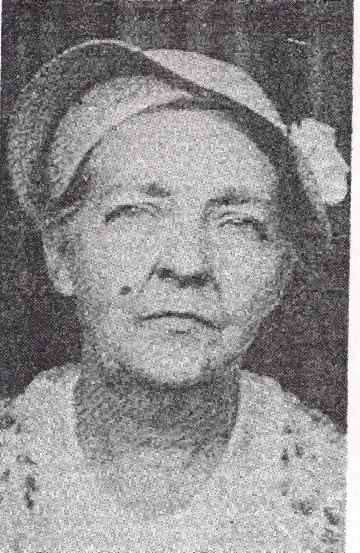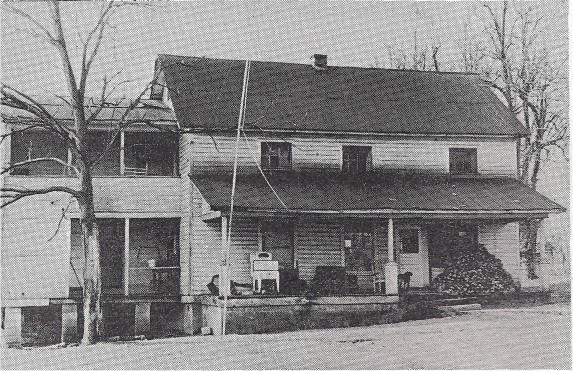Recently and quite by accident, I came across some very surprising information. In doing research at the newspaper office in Jamestown, I learned that the first woman to run for governor in the State of Tennessee lived in Clarkrange. But the most surprising thing about her was the fact that she received a teaching certificate at Overton Academy in Livingston, a predecessor school of Livingston Academy. The Robert and Mary Eldridge history book says that Overton Academy was chartered in 1806 and was located in the Town of Livingston. The trustees of this school were Moses Fisk, John Overton, James Chisholm, John B. Cross, Henry Reagan, John Greene, and William Marchbanks. Little else is known about this school.
To get a look back at the early years of Kate Bradford Stockton, I’m using information taken from the Fentress County History book. An article was written by Mabel Stockton Merchant, one of the four daughters of Kate Bradford Stockton and husband Joe Kelly Stockton. Mrs. Merchant says this about her parents:
"Joe Kelly Stockton and Kate Bradford were classmates and sweethearts, though they didn’t marry until he was 25 and she was 24 (old age for getting married in those days). They owned the first pressure cooker in the county and she canned meat as well as vegetables. Kate owned a sewing machine, but she was never interested in house work. Joe Kelly was a dirt farmer, but no chauvinist. He bathed and fed his children and later, his grandchildren. While his wife was teaching school to his three older children, he let the baby ride on his plow handles when he plowed the fields. He was an active Democrat in county politics until he became a Norman Thomas socialist. He was county trustee at a very busy time in his life. He was helping his parents, his wife’s parents, and providing for his own growing family as well as paying taxes for "widder women" to keep them from losing their homes. He had no money to buy war bonds in World War I. In a pamphlet, an opponent in the trustee race called him a traitor to his country for not doing so. Joe Kelly was a mild mannered man, but was well known for meaning what he said and for not making threats. He got wind of the pamphlet and sent his opponent word that he could criticize him any way he wanted to, but if he called him a traitor, he would kill him. The opponent had already passed out many of the pamphlets, so he spent a lot of time gathering them up and erasing the word "traitor." Joe Kelly and Kate eventually moved to Allardt to look after Kate’s parents."
Here is what the Tennessee Encyclopedia of History and Culture has to say about Kate Bradford Stockton.

"A socialist and the first woman to run for governor in Tennessee, Kate Bradford Stockton was born in Stockton, California, in 1880. She was a direct descendant of William Bradford, second governor of Plymouth Plantation. Her grandfather, Arthur Bradford of Pennsylvania, was appointed consul to Amoy, China, by Abraham Lincoln. After an unsuccessful attempt at ranching in California, the Bradford family moved in 1884 to Fentress County, Tennessee, where Kate’s father took a job with the railroad. Kate attended a local subscription school founded by the Stockton family and went to Overton Academy in Livingston where she earned a teaching certificate. She continued to teach after her marriage to Joe Kelly Stockton in 1904 and the birth of four daughters. Despite the press of her domestic duties, Kate was an early advocate of birth control and an outspoken feminist.
"Joe Kelly Stockton was active in local politics, and by 1920 both he and Kate had embraced socialism. Labor activist Myles Horton boarded with the Stocktons when he worked for the YMCA in the early twenties. Horton was one of the first to encourage Kate Stockton to run for governor. After a trip to Scandinavia, Horton decided to open a cooperative school in America, for which the Stocktons offered him several hundred acres of land. In 1932, Horton filed the charter for Highlander School in Fentress County, but after one summer, the school was moved to Monteagle, TN., in Grundy County. Highlander was a controversial school in the South that for years taught leadership skills to blacks and whites in defiance of segregation laws. Horton is often credited with being one of the sparks that ignited the civil rights movement in the United States. Eleanor Roosevelt, Rosa Parks, Rev. Dr. Martin Luther King, Jr., former Mayor Andrew Young, Fanny Lou Hamer, Woody Guthrie, Pete Seeger, and Stokeley Carmichael were among those who attended classes or taught at the school. In 1960, the Highlander School was ordered closed by the Tennessee courts on the grounds that it had violated its charter by "permitting integration in its school work," that it had operated for Mr. Horton’s personal benefit, and that it had sold beer in violation of Tennessee law.
"In the early 1930's, the Socialist Party in Tennessee consisted of only a few hundred members. Kate Stockton became the party’s candidate for governor in 1936 largely because no one else was willing to run. The only political experience Stockton had was as state committee chair. The fifty-six-year-old candidate frequently drew on her teaching experience to explain the economic problems of the United States to women unfamiliar with economic theories and to try and convince them to vote for Socialist candidates. The press focused on her small stature, neat appearance, and correct speech rather than her message for radical change. It was no easy task to run a statewide political campaign in Tennessee in the 1930's. The lack of paved roads in Fentress County forced Stockton to ride a horse to Cumberland County and catch the train to other parts of the state to meet her speaking engagements. Since the Socialist Party could not provide financing for the campaign, Stockton began with a personal contribution of five dollars and asked other supporters throughout Tennessee to send one dollar a month to support the campaign. This fund raising provided two mimeograph machines and highway signs. A red sound truck furnished by the national office was used extensively to transport Stockton to her speaking engagements in major cities throughout the state. After a well attended rally in Memphis, she was warned about her denunciation of Democrat Gordon Browning. The Shelby County sheriff indicated he could not protect her from ripe tomatoes and other missiles that might be thrown at her if she continued her socialist message. Undeterred, Stockton spoke whenever and wherever she could attract an audience. Stockton knew her chances of winning the governorship of Tennessee were improbable, if not impossible. She received only 3,786 of 410,814 votes.

The Clarkrange, TN. home of Joe Kelly Stockton and wife Kate Bradford Stockton. Note the washing machine on one side of the porch and a wood pile on the other.
"Kate Stockton returned to her home after the election but remained active in politics. She was in Birmingham, Alabama, in 1938 with Eleanor Roosevelt, Mary McLeod Bethune, Myles Horton, and others for the organization of the Southern Conference for Human Welfare. The group met again in 1940 and 1942. By this time, the FBI was closely scrutinizing Stockton and others. Myles Horton was under constant pressure from national and local authorities for his political activism, but Stockton was able to return to relative obscurity in Fentress County. In 1939 she wrote a short book explaining the advantages of cooperative living, and at the time of her death in 1969 she was working on a similar book for senior citizens. Kate Bradford Stockton was buried near her husband in the Stockton cemetery in Fentress County."
If, prior to doing the research for this story, I had been asked to guess where the first lady who ran for governor in the State of Tennessee was from, Fentress County would have been one of the last places I would have thought of. It’s hard to imagine how she dealt with all that she must have faced while living in a rural area and being that involved in politics. That was something women just didn’t do in that day and time, especially around here. It’s my opinion her name is one that should receive a lot of recognition, and including her story in the history of Overton County schools would be a good place to start.